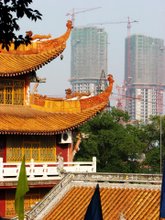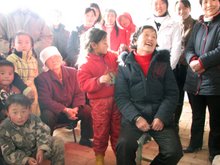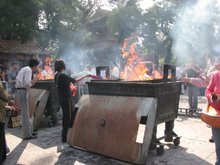Ningxia
The trip from the Yinchuan airport to Dabba was breathtaking on a few different accounts. The first was the outrageous driving tactics of our driver and fellow commuters, and the second, the incredible scenery and lifestyles of the people we passed along the way. Small-scale farming is still very prevalent in this area, and from the highway we watched women wearing bright red and pink head scarves bend over gardens, and men in navy or army green cultural revolution garb herding groups of 30-50 sheep around fields. Families work their land without all of the machinery that has transformed the American landscape, and people in bright yellow corn and wheat fields created contrasts that were often brilliant.
Clay brick walls enclose almost every house and field in the area, transforming the landscape. The walls are beautiful, similar to the old stonewalls one would find in the woods of New Hampshire or Vermont, but surprisingly comprise one of the most severe threats to the local economy and life. The traditional bricks used to make these walls and houses are made from the same rich topsoil that the farmers need to grow crops. Across the region, however, it is common for tree trunks, telephone poles, and older houses to be supported by a 3-5 foot plateau of dirt, which exists because the rest of the area has been carved away for bricks. The topsoil also protects the desert-like ecosystem from being swept away by violent dust storms that blast through the region throughout the winter. It is now illegal to make bricks out of topsoil, so hopefully the damage will not be permanent, and the scattered plateaus (just like SUVs, incandescent light bulbs, and, bio-accumulating chemicals) will remind us of our shortsighted ancestors.
Once we were off the highways, the traffic changed from vehicle to bicycle, motorbike, tractor vehicle, pedestrian, and livestock. The people live right along the road, and while women sat husking great piles of corn, commuters expressed their dominion with incredible blank-faced indifference to our drivers incessant honking. I would not blame this poor agricultural community for smiting the shiny silver minivan that matches the dozens of pollution-belching smokestacks on the horizon; even (especially) if they knew we were actually a well-intentioned NGO swooping in to save the day! I couldn’t stop reading the impact of hardship and climate on the people’s faces, the tired bicycles, and the dust covered storefronts. The kids at least seemed to be walking in smiles, snacking, laughing, and breaking everyone’s bleak.
The next few days were spent in meetings with various members of the ALCAN Sustainability Team, interested community members, and the CEO of ALCAN Ningxia, a socially enlightened Brazilian man with a taste for hip sweaters from the 80s. Our mission for the week was to help develop the company’s CSR program by creating the first round of environmentally and socially oriented community projects. In the past, ALCAN projects have been administered and funded by ALCAN: they bring in a doctor for immunizations, create a scholarship program, host a seminar on bird flu etc. Ideally our work will result in a series of projects that will become self –sustaining, created and executed by community and ALCAN volunteers.
The week was unbelievable combination of excitement and frustration with poignant stories and ideas revealing themselves just as I was beginning to feel like we were talking in circles or unable explain the core values and vision of the effort. In the end, after 4 exhausting days, we had planted the seeds for at least 4 realistic projects, created a timeline, an action plan, and scheduled a return visit for Yang (my colleague in Chengdu) and I for sometime in mid November. That night we met a group of 25 ALCAN and community members to feast on a traditional 3-hour 12-course meal where we affirmed all of our hard work shared stories of our lives, and laughed at my and Carolyn's persistent attempts to communicate in Chinese. In NGO work, I have concluded that you cannot allow yourself to be deterred by scale. We left Ningxia feeling optimistic and hopeful, believing, as we have to, that whatever evolves from the effort of the past week will create not a drop, but a minor tidal wave "in the bucket". Hopefully I can carry this energy with me through my first weeks on the next chapter of my adventures.... in Sichuan!



